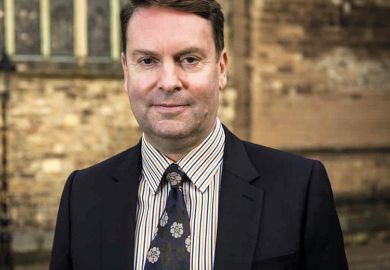Dominic Shellard exited De Montfort University (DMU) as vice-chancellor in 2019 under a cloud. Actually, it was more of a tornado, as his departure triggered an investigation by the English sector regulator that found “significant and systemic” failings in the institution’s governance, following reports in The Times that he held shares in a holding company run by the then chair of the university’s remuneration committee, which approved his £64,000 pay rise.
So the vice-chancellorship at the Leicester institution, which Katie Normington assumed in January this year, is one of the trickier jobs in higher education.
“At DMU I’ve taken over after a particular situation,” said the former deputy principal (academic) at Royal Holloway, University of London, whose academic background is in theatre history. “There’s a lot of work to do. It’s a place of huge potential.”
THE Campus views: Authentic leadership isn’t new – but we need it more than ever in HE
The Office for Students report after Dr Shellard’s exit, published in July 2019, set out an action plan, prompting De Montfort to accept that its governance “was inadequate and that the governing body did not provide sufficient and robust oversight of the university’s leadership, in particular the vice-chancellor”.
What issues does that leave for the new leader?
After a “complete overhaul” of governance and completion of the OfS action plan, “there needs to be a continued culture change”, said Professor Normington. “Large moments in an institution’s history can shake the confidence of the institution – and shake it particularly between leadership and the rest of the staff.”
The upside of starting in the pandemic and its online shift, Professor Normington said, was that she had been able to hold 48 virtual “listening sessions” with staff in her first two months: “I couldn’t have done that if I was doing it in person.”
The “cultures that I believe in are very much those that are about dispersed leadership”, she continued, emphasising also the importance of transparent processes for appointments and ensuring that “people feel they are able to speak up” where there are problems.
“Those cultures have to be modelled from the top,” she added.
In consultation with staff, students, governors and external partners since Professor Normington started, De Montfort has produced a new strategy, which includes, she said, “something we’re calling ‘the empowering university’: a real vision there to make sure we empower students, staff and our partners to create a fairer society.
“I think that anchors [the strategy] in what DMU is. It is very much about first in family [to go to university]…And obviously we have an extremely diverse student body: 50 per cent from ethnic minorities.”
Professor Normington also talked about the strategy giving the university “a steer back to the region and the city”, and highlighted what the university can do to help “level up”.
“The East Midlands has got huge opportunities to try to increase productivity, real scope to do that. But also Leicester as a city – the skills qualifications held by the working-age population are half that of the national benchmark. So there’s a real job and opportunity there,” she said.
In an inaugural lecture in September, Professor Normington tackled the subject of “The invisibility of the real university: how can we reset public perception of the usefulness of higher education?”
One factor in why it was “so difficult for us [universities] to be able to present a positive message” was that “universities are actually invisible – they [are] around all the time and yet we don’t notice them”, she argued.
Professor Normington highlighted that, contrary to the perceptions of some in media, policymaking and business, universities like De Montfort were providing apprenticeships and short courses, while university research provides us with the medication we need and – in these pandemic days – the air we breathe, via studies on how to use ventilation against Covid.
In explaining the impact of universities in everyday life, “a lot has got to be about how we talk to people outside universities on their terms, in language they will understand”, she added.
Of her own university experience, Professor Normington, who took her undergraduate degree at the University of Exeter, said: “I don’t think it was always a given that I would go. My grandmother left school at 14 and became a maid in service; my mother and her two sisters didn’t get any higher education, either. I look at my life and the opportunities I’ve had, and I think it’s why I’m so passionate about the fact that we provide opportunities for students who might not otherwise get the chance.”
Register to continue
Why register?
- Registration is free and only takes a moment
- Once registered, you can read 3 articles a month
- Sign up for our newsletter
Subscribe
Or subscribe for unlimited access to:
- Unlimited access to news, views, insights & reviews
- Digital editions
- Digital access to THE’s university and college rankings analysis
Already registered or a current subscriber?








